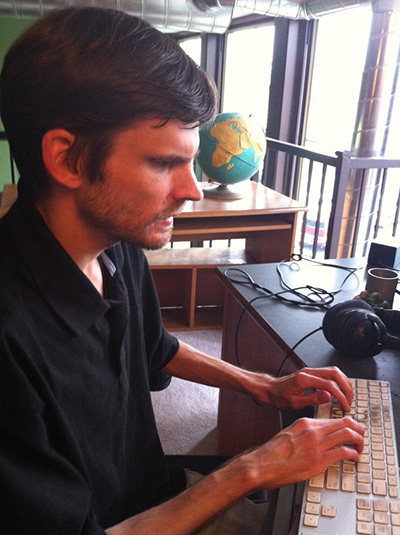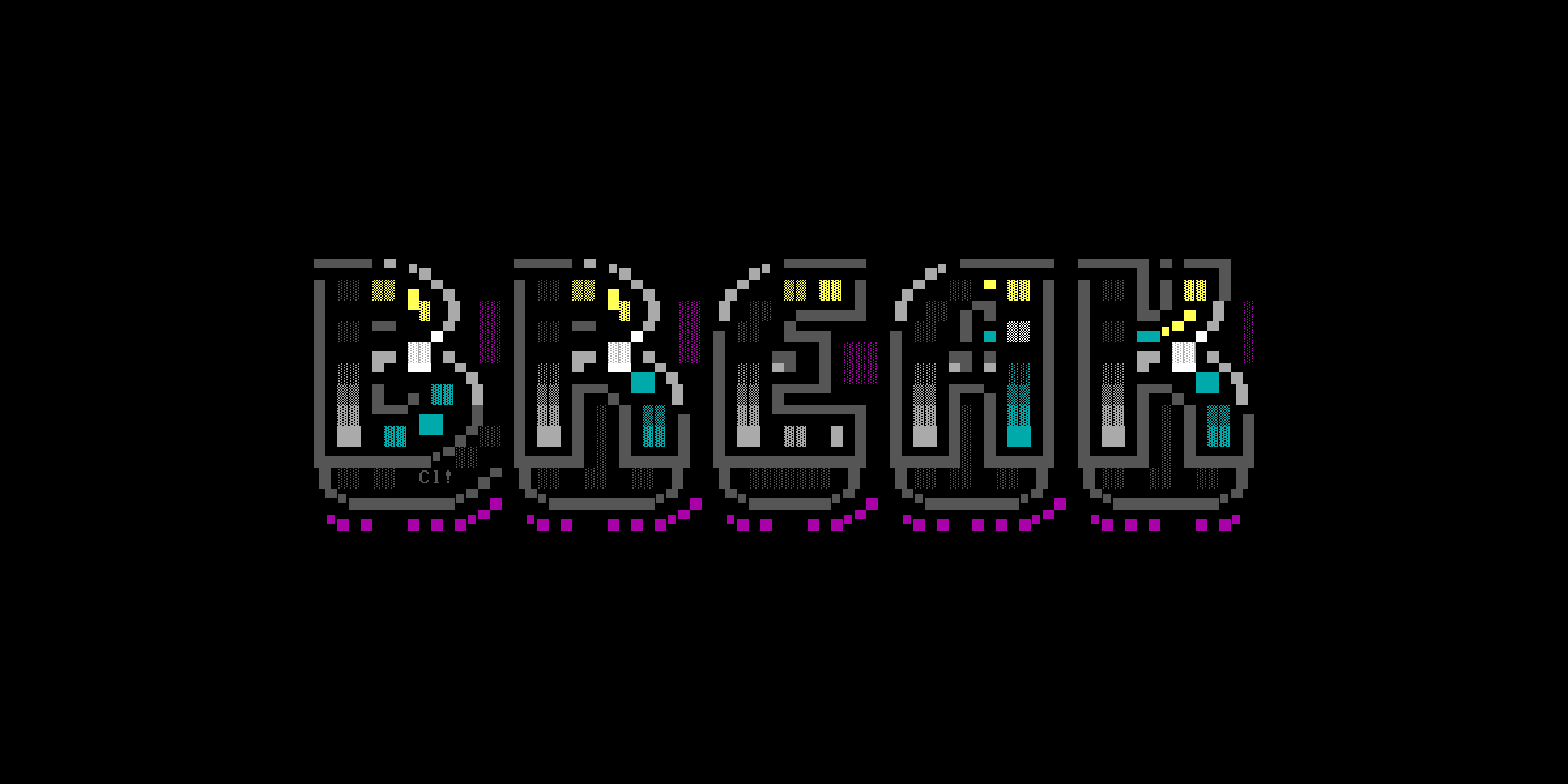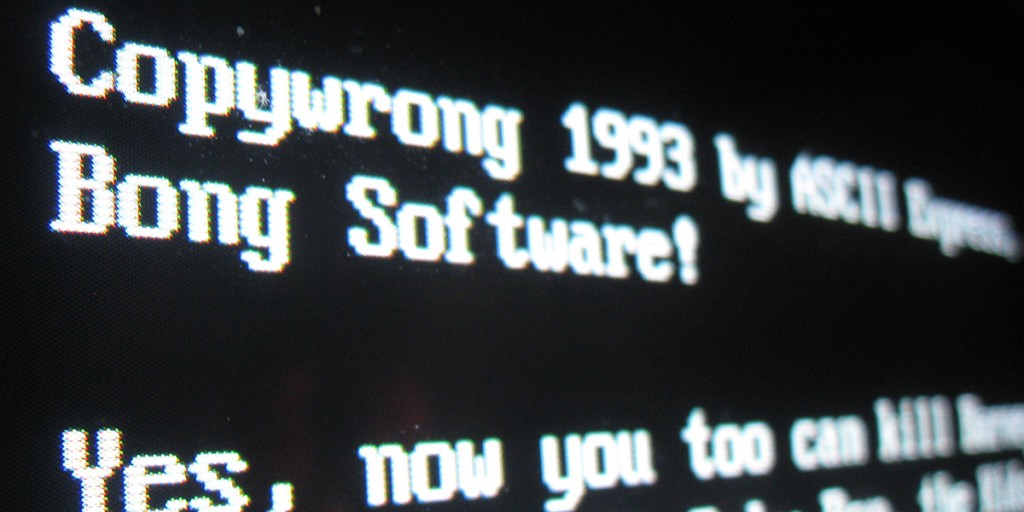Austin Seraphin has been blind since birth and has loved computers since he got an Apple IIe at age 6. In 1993 he released Barneysplat!, one of the zaniest BBS door games ever conceived, in which players try to kill or intoxicate Barney the purple dinosaur and his cast of kids. Today Seraphin works as an accessibility consultant who specializes in making iOS apps more usable to the blind.
As a teen, anti-Barney humor definitely appealed to me and I definitely remember playing Barneysplat!. This interview was conducted by email Feb. 6 through May 6, 2013.
Do you enjoy my retrocomputing interviews on Break Into Chat? Please join my email list and stay in touch. 📬
In your interview with Jason Scott for ‘Get Lamp,’ you demonstrated your old Apple IIe computer. What impact did that Apple have on you?
I got my Apple IIe at a young age, six or seven. My parents used computers in their business and I think they must have seen the potential. I remember them telling me that one day I would read a newspaper online. At the time that seemed amazing; now it seems commonplace.
They also saw the advantage it would give to me as a blind person. We got the first speech synthesizer and card. My mom and a friend had to put it in themselves. I first learned to program on this machine, since it had AppleSoft BASIC built in. What a great machine! And as you saw it still works.
Time passed. I got into the PC and reluctantly said goodbye to the Apple. I used MS-DOS to its fullest. I hated Windows. I ended up with Linux.
Then in June of 2010 I got an iPhone and my life changed forever. It still seems amazing how Apple figured out a perfect way to let a blind person use a touch screen. After that I got an iMac and a MacBook Air and have officially rejoined the Apple family.
Apple has totally changed my life by making fully accessible products.
How did the iPhone change your life?
The iPhone changed things because it put this connection in my pocket. Parents used to ask how much time we spent online. Now that has become irrelevant. We have a constant connection.
And Apple has really made accessibility a priority. It gives the best experience and opens that world to the blind. Think how long sighted people have sent texts and managed contacts. Finally in 2010 [the blind] gained that ability. Same with trackpads and Mac OS.
As I said in my recent talk, the iPhone replaces a lot of assistive devices. You’d spend twelve times as much [on assistive devices]. And now I can read a menu in a restaurant. Little things…
What led you to get interested in programming, and what were your early projects like?
I started on the Apple IIe. It had AppleSoft BASIC built into the ROM. In other words it merged the operating system and a programming language. I only knew a few commands: RUN to run a file, BRUN to run a binary file, LOAD to load a file, and CATALOG to get a list of files on the disc.
One day I had the idea to type the word LIST. I have no idea why. I guess childhood imagination. It started listing out the currently loaded program, the famous ELIZA. It all hit me, you can make the computer do whatever you want just by typing in these instructions. And that did that!

I wish I still had my early disks, but sadly I don’t. They have tons of my old programs, stuff I’ve forgotten.
I remember writing a lot of games. I also modified a lot of programs. I remember a football game. I think I had boxing, basketball, bowling and one or two made-up games. Lots of little and not-so-little text games. Programming gives me a way to understand something. You have to totally know the rules of a game to program it. You may enjoy this funny article I wrote.
In a full circle, I’ve begun learning how to write iPhone apps with a language called RubyMotion. I decided to start simple by writing the simple game of Nim, where you and the computer remove coins from a pile and whoever takes the last coin loses. I’ll probably write a few other little games like this just for practice. So even now as an adult those childhood favorites come back.
On your website you wrote: “I moved to the PC in middle school. I started running a bulletin board, and to this day I have never had more fun on a computer.” How did you discover BBSes, and why was having your own board so much fun?
OK, let’s see. My Apple had a 300 baud modem but I don’t recall using it much. My parents used it for their business, though. I also remember some friends having modems and going on a board or two. I discovered bulletin boards for myself when I first got a PC in 1990. I knew of one or two boards, then a friend gave me a huge list and that opened the door. I knew right then I wanted to run my own board.
Running a BBS took a real commitment. For a while, until multitaskers became popular, running a board meant running a board. You couldn’t do anything else with your computer. If I wanted to use the computer, the board would go down.
When someone logged in it would have the machine’s complete focus, and the sysop’s as well. It felt much different then putting something on a server and just letting it run. When a user called in, you couldn’t do anything else, you knew it, and would get to know them. One user might log in and always go to the door games. One might log in and go to new files. Another might actually post a message. And some would go straight to chat. You could chat with users, break in any time, whatever. I could even tell their activity just by listening to the sounds of the hard drive. I could lie in bed and know what the user did.
Boards also had a geographic component, since most of us could only make local calls. If a user got out of hand it might result in a physical confrontation. More positively, this could also mean people could meet for parties and just hang out. We had many fun times.
Running a board felt personal. It felt like inviting someone into your home, and many BBSes even used that metaphor in their rules. Putting up a web site feels like putting up an exhibit in a public space. You don’t have as much of a sense of your visitors. I miss those days and have tried to recreate them without success.
What were some of your favorite BBS games? Were there games you didn’t like, or couldn’t play easily, because of your blindness?
Wow, I’ve really had to think about this to remember those old games. Your wiki also helped. I definitely remember Trade Wars, Planets: TEOS, Cripple Smash, Solar Realms Elite, Legend of the Red Dragon, Global War, Kannons and Katapults, and Operation Overkill. The low-resource environment of the time made for ideal games, most of them text-based or with very minimal graphics.
I do remember trying and failing to play The Pit because of its graphical nature. It still fascinated me that they had started making graphical games. I remember stumbling around a lot in Operation Overkill; you have to go around a map a lot, but it did provide coordinates, and ASCII graphics.
Reading that list definitely takes me back. Oh hey and I just remembered the first game I ever installed: BBS Crash. That guy made several games with the same theme.
Oh and I looked at the delightful wiki article about Barneysplat! It links to a review that said that one of the final versions had a Zork-like game where you could kill Barney. Actually it had more similarities with Rogue than Zork, and it would only come up as an option in the bonus round if you FAILED to kill Barney, as a final way to get him.
Why did you create Barneysplat! ? Did you have a deep-seated hatred of Barney?
I really did it as a programming exercise. I wanted to write a door game, but couldn’t think of any ideas. I remember sitting in homeroom and a friend came by. I told him I wanted to write a game and he said: “How about you make a game where you have to kill Barney, and call it Barneysplat! All one word with an exclamation point at the end.”
I actually took his suggestion seriously and got to work. I did the bike race and the tea party, and beer and pot as well. Everyone loved it so I just kept adding more and more and it just got nuts. I do have twin sisters ten years younger, the prime age for watching Barney, but they didn’t like the show. I managed to explain to them that I was writing a game making fun of the show, if they had ideas. Ashley suggested dropping a piano on Barney, so I put it in. Perhaps having younger sisters made me more aware.
I don’t remember watching the show much, but I didn’t really need to. As the game got more popular users also began submitting ideas, and I put in some really good ones. Then finally I realized I should just make a scripting language so people could write their own events. I wish I would have done that from the beginning. If I had to redo it, I would do it that way. Just make it parse XML or something.
By then the BBS scene had started winding down anyway. I graduated high school and things sort of fell apart. But Barneysplat! remains! In an interesting epilogue, the friend who originally suggested the game emailed me a year or so ago. He used a different name so I didn’t recognize him. He asked if I wrote Barneysplat! and if it would be available for Xbox soon. I said I don’t know how to program it so probably not, but you never know.
Let’s talk about positive reaction to the game. You have written elsewhere that almost overnight tons of people began calling you. What was the game’s sudden popularity like for you?
Well back then they had those shareware CD-ROMs. A lot of boards would put them online, and files from them would become very popular as a result.
One morning I woke up to go to school only to find a bunch of long-distance callers to my board. And that didn’t happen as a rule with smaller local boards. So I knew something had happened, and I found out that someone had put Barneysplat! on a CD-ROM.
Boom! Overnight, I got calls from all around the country and quickly started making friends. It really amazed me. This simple game I wrote for fun suddenly became quite popular. I thought of it when my iPhone article went viral. It felt like that. That really propelled the game, and impressed my mom, since I started getting small letters and checks in the mail.
Was there negative reaction? In your game documentation, you called out PBS saying “I’M WAITING FOR YOUR LETTER!” Did you ever get such a letter?
I didn’t get any negative reactions. In retrospect it seems kind of funny, given the misspellings, drug use, violence and all that, that nobody ever complained. I’d love to make a Barneysplat! app now, but sadly I think times have changed, and that it definitely would get a negative reaction. You could not have a part where you can shoot the cast with a shotgun now, oh no no no!
You also mention in your Barneysplat documentation the friends you made because of the game — and several times you invite people to give you a call. Why was that important to you?
In the beginning I just put my number in the documentation in case sysops needed help installing the game or something. I had no idea it would go viral and as a result tons of people would end up with my number. This meant I got to talk to some very odd people, and become friends with many of them. I had some great conversations and got some great ideas for the game, too. People like us often had a difficult time in high school — the weirdo computer kids — and I think that played into it as well. We all helped each other get through it.
For years I’d still get an occasional call from someone nervously asking if I wrote the game. It showed me that it has a lasting influence. I sometimes wonder what happened to everyone. We all sort of lost touch when the BBS scene died. I do know one of my friends went on to work at Apple, and now does computer security.
This also shows the personal nature of the BBS scene. Nobody [today] would put their phone number on their blog or in a README file!
Tell me about your online experiences post-BBSing.
It happened gradually. I remember first hearing about the ‘net. Some people got on it, and would get things from Usenet. I remember CompuServe had some primitive internet services, same with the other online services. I think I first got on the ‘net on Delphi. I remember reading Usenet and using a very low tech web browser. But I still loved it … in a way.
But something also felt lost, like moving from a small town to a city. The city has lots of great things, but you don’t know everyone. BBSes had a strong geographical component since you could only make local calls, and the same people would go around to different boards, so everyone kind of knew everyone. The ‘net feels big and open.
On the positive side, the ‘net connects the world in ways we could have never imagined. We could send an email or have a video chat no problem. Barneysplat! had simple ANSI music and sound effects. Now we have HD video.
And we have social network sites like Facebook and Twitter. So in the past a bunch of us would run our own BBSes, our own social networks. Now everyone goes to a central network. So you can see the change.
What keeps you busy these days — and why have you been crossing the ocean?
I’ve learned RubyMotion to start writing iOS apps. I went across the ocean to speak at a conference about RubyMotion and accessibility.
I work with developers to make their apps more accessible to the blind; and soon I will start writing them as well.
What are some common accessibility issues that iOS developers overlook?
The majority of problems with iOS apps come from poorly-labeled or unlabeled buttons and controls. For instance, if you init a button with an image and don’t set a title, VoiceOver will use the image name as the title. This can lead to annoying titles like “image930174879816.png button.” Fortunately if you set the button’s title it becomes the accessibility label by default.
Other problems can arise from using custom views. You can make any view accessible if you implement the proper methods, but it requires special effort.
In general, though, iOS gives a wonderful experience.
The fact that BBS door games were primarily text, much like interactive fiction, made them accessible to you. But BBSes died and interactive fiction fell out of the mainstream. Did you continue playing computer games post-BBSing? Has accessibility in gaming improved in recent years?
True, after BBSes and text adventures became less popular, I really didn’t play games as much. Developers have made blind games for all platforms, though, and actually a lot of Windows games exist.
Now I have a Mac and they’ve started making some for that platform as well, such as the adventure game BlindSide. They also made that for iOS.
Again, iOS has really caused a resurgence. For instance, tons of people have rediscovered interactive fiction through apps like Frotz. They’ve made some great games, from traditional ones like chess and cribbage to whole new concepts like Stem Stumper and Aurifi. And we could always use more.
Too bad Apple would never approve a Barneysplat! app.


Share your thoughts!